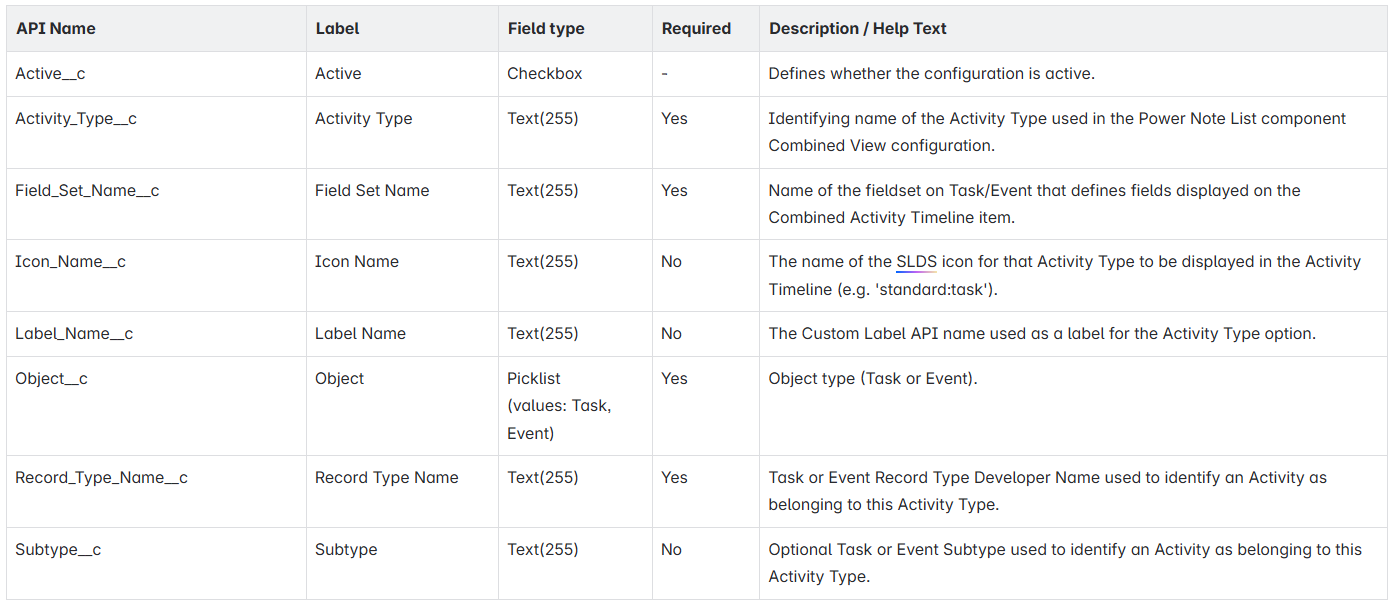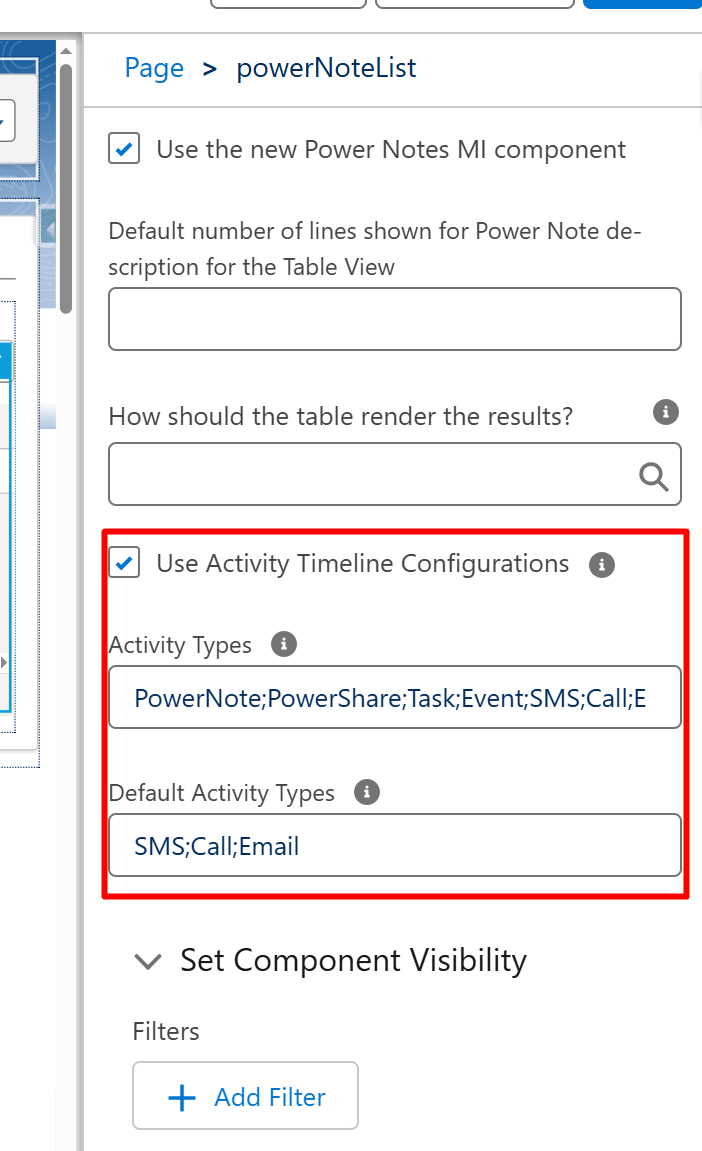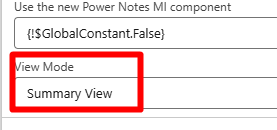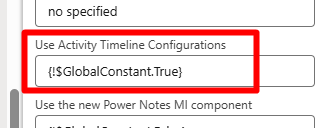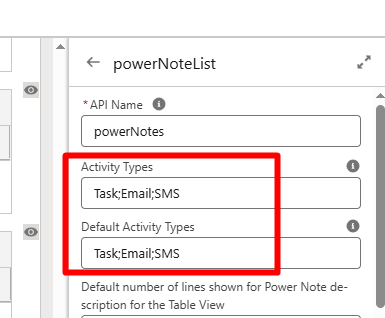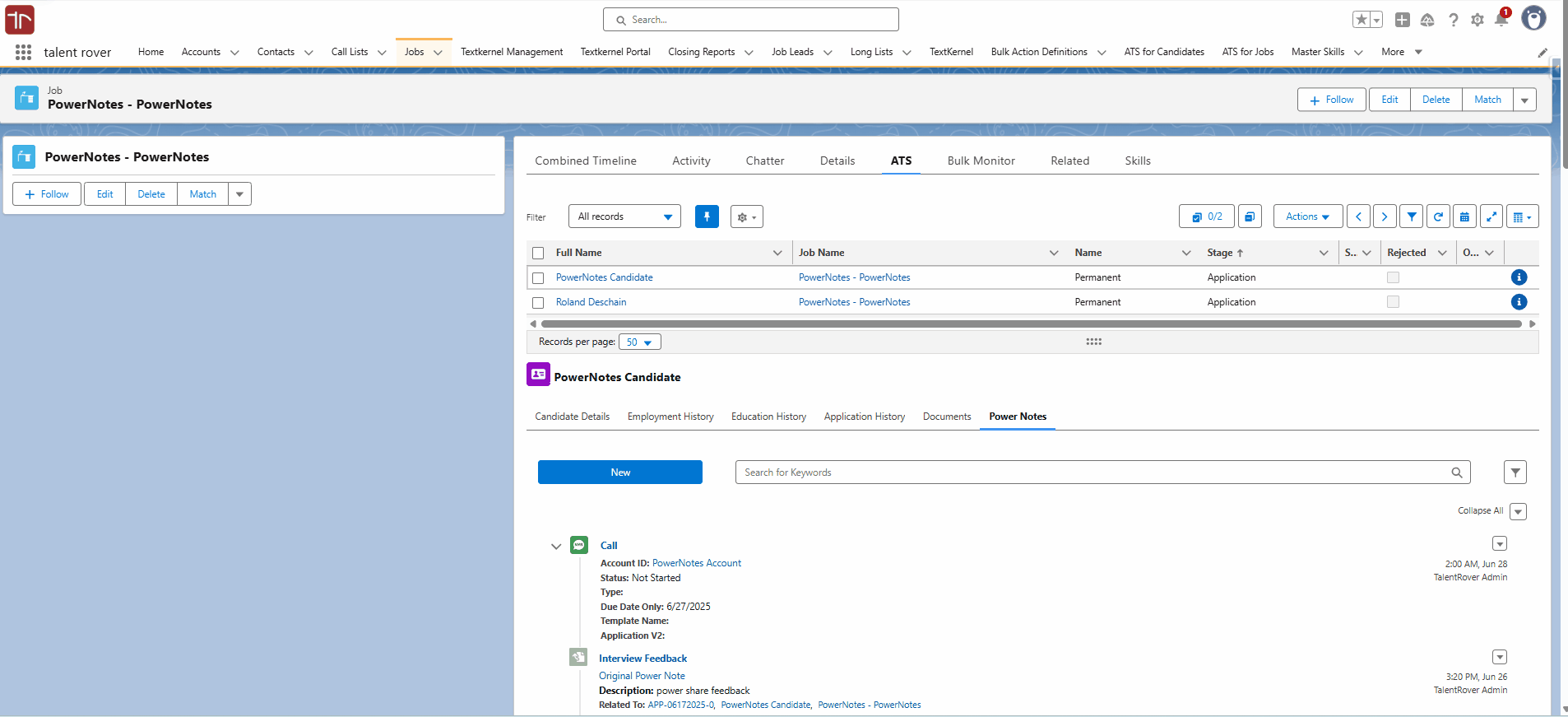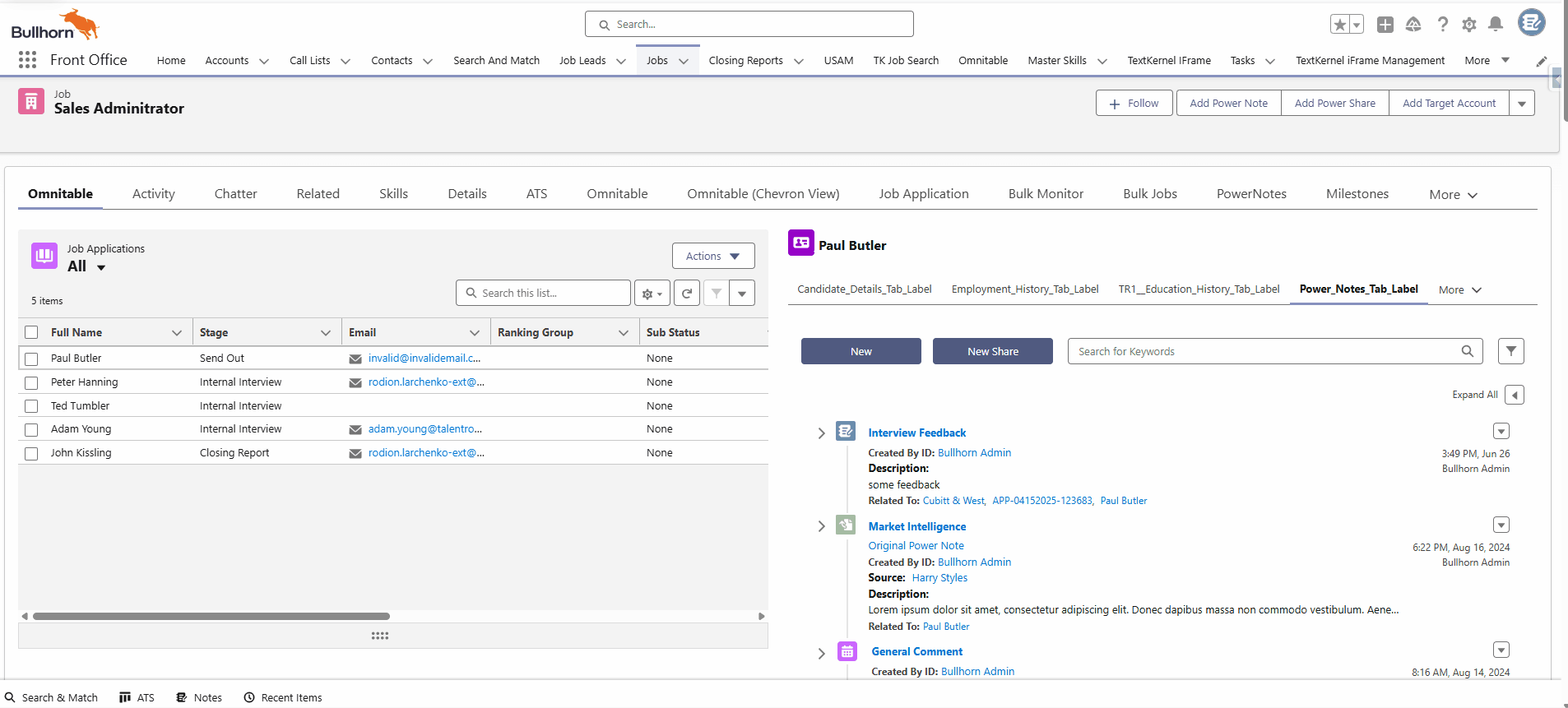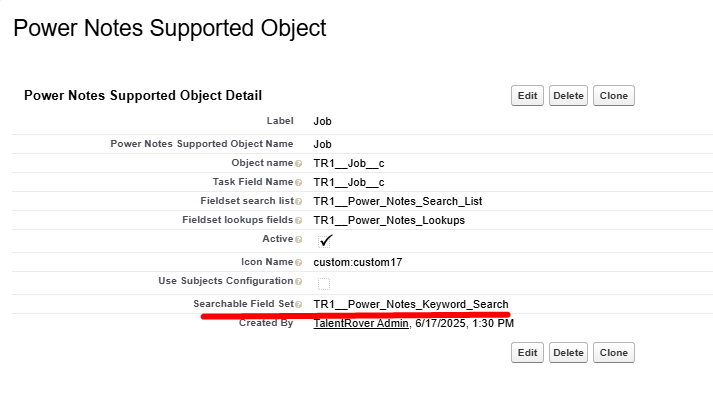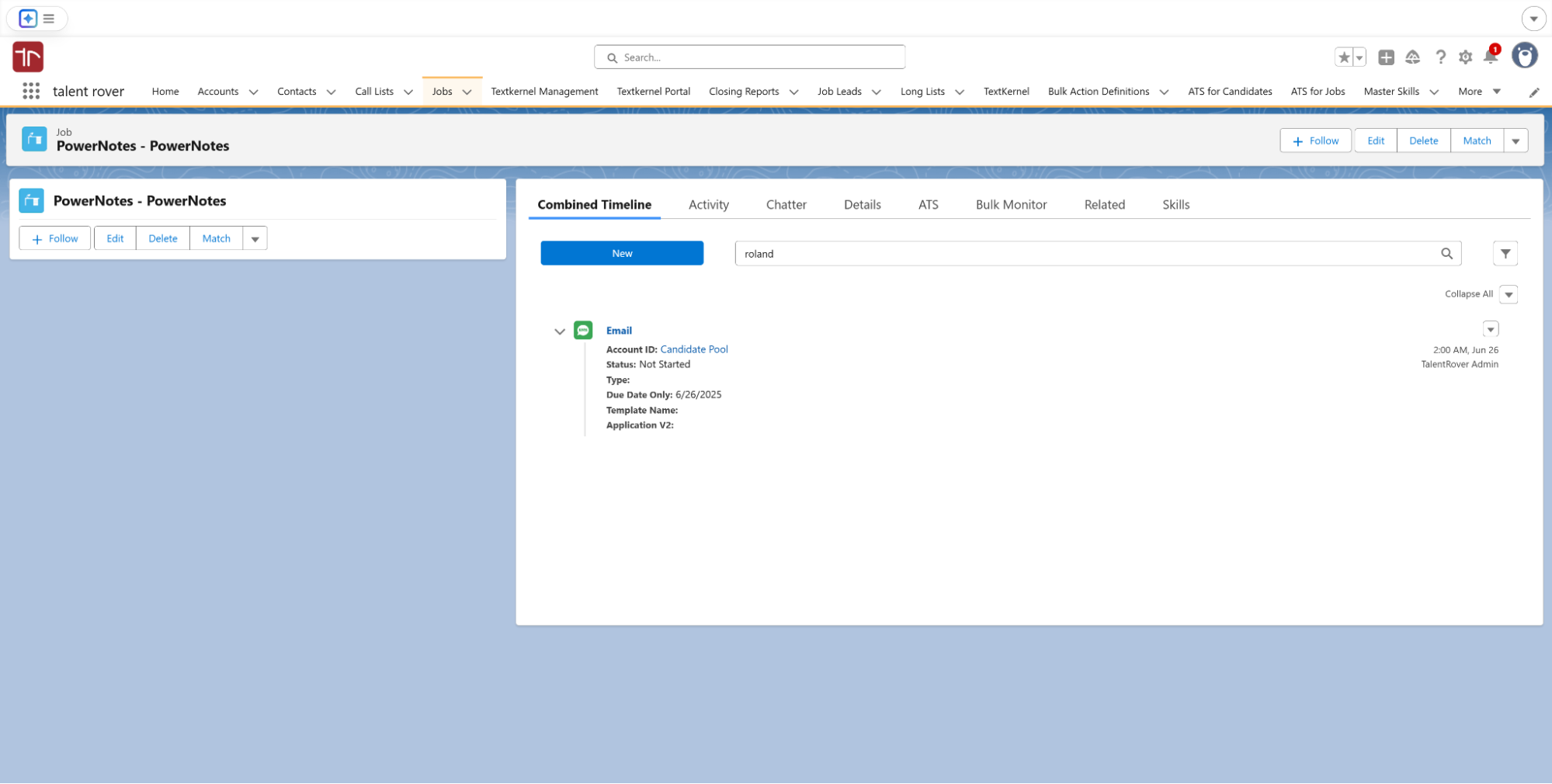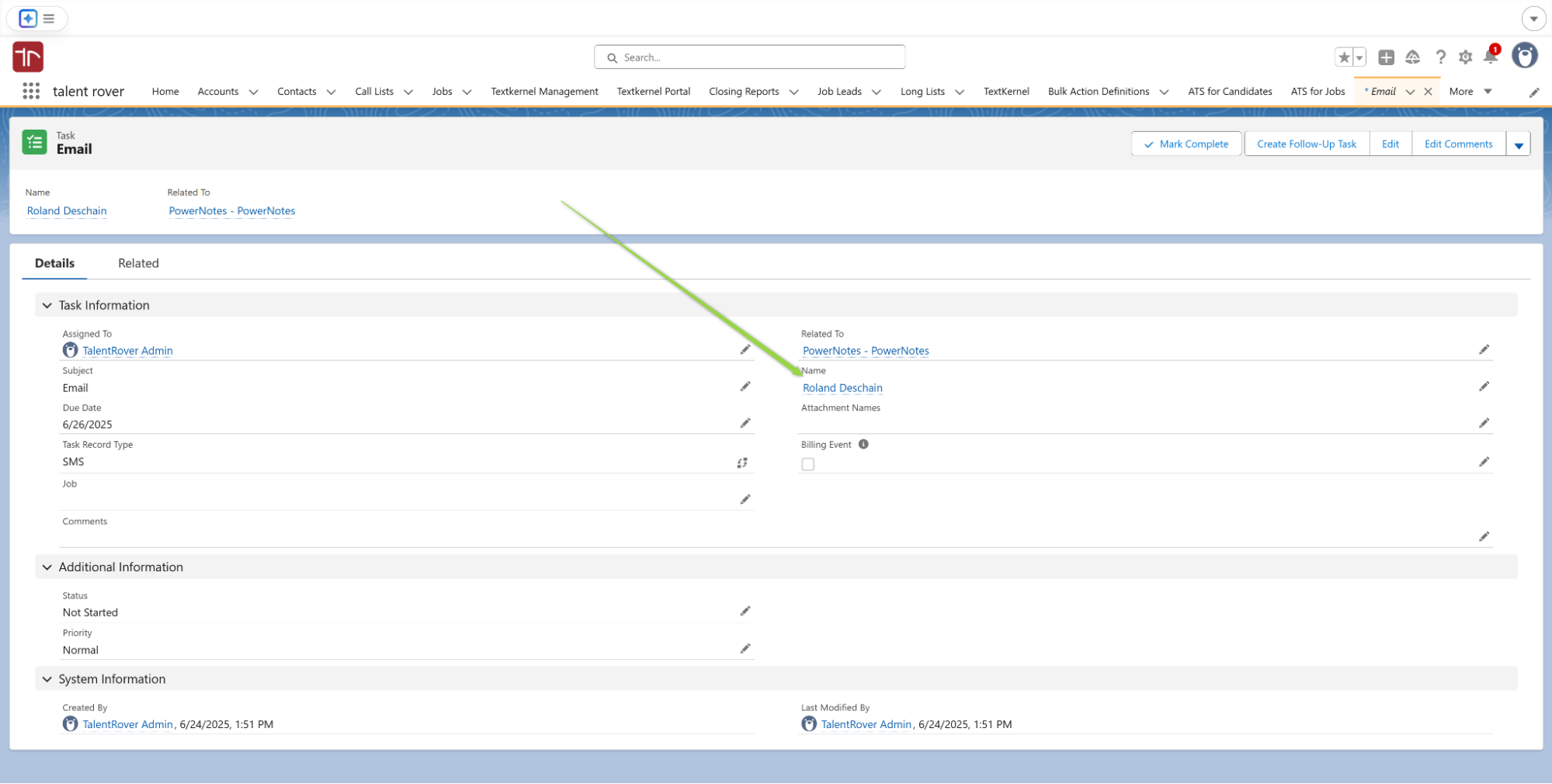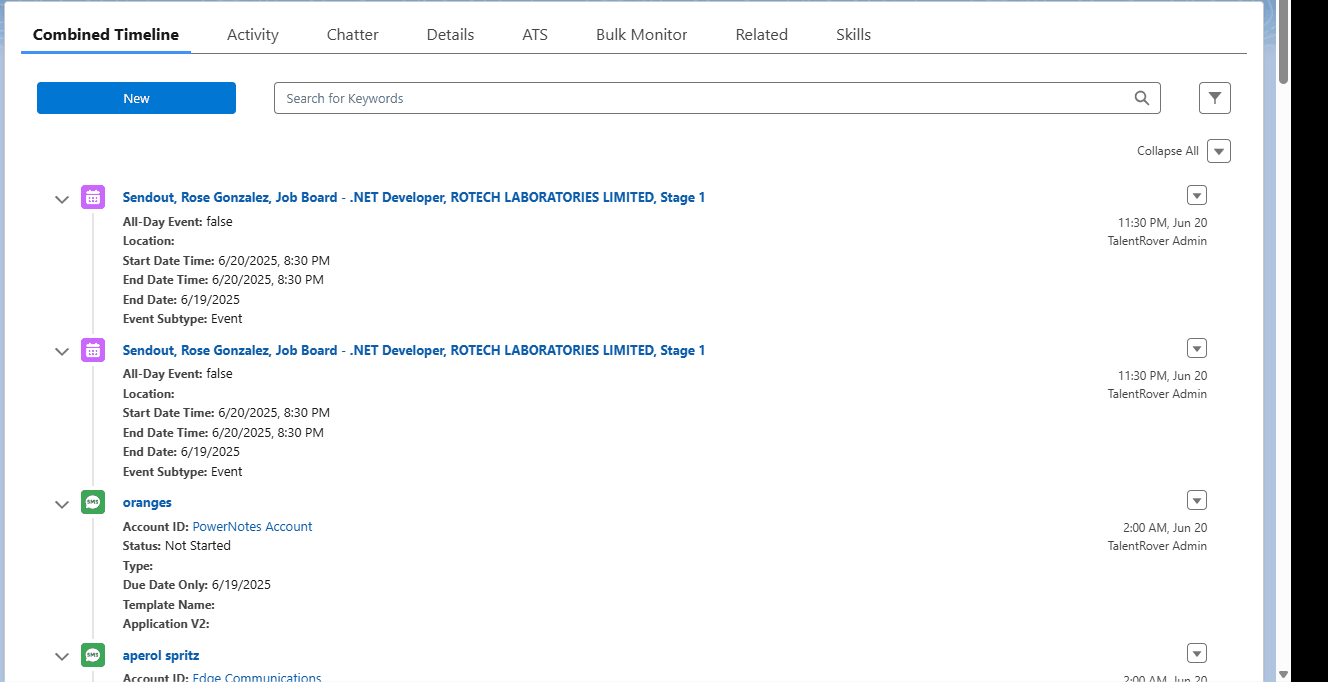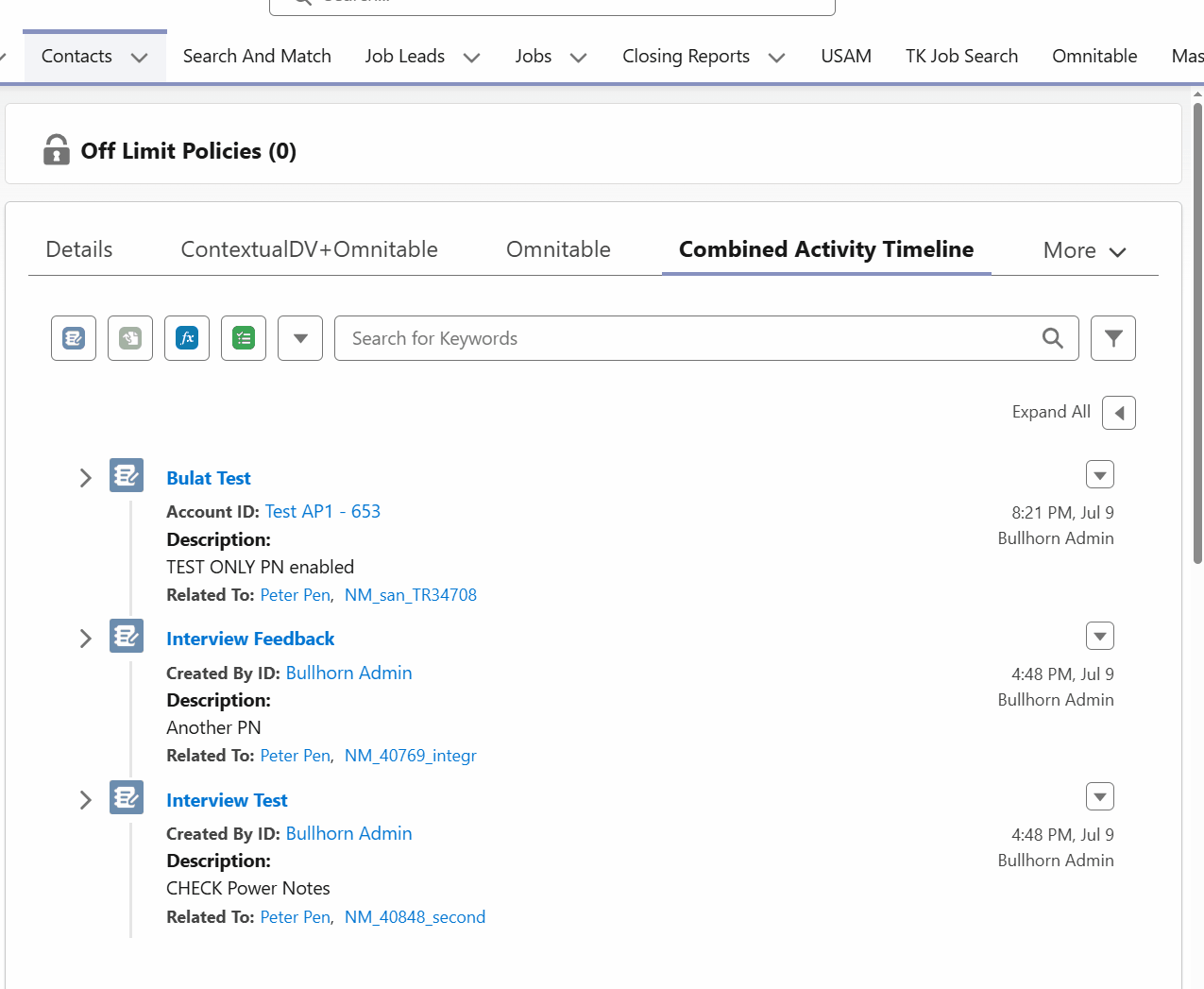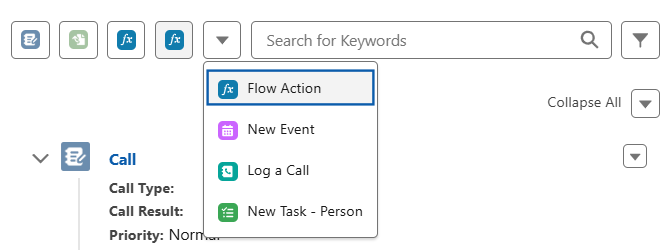Combined Activity Timeline
Recruiters can now effortlessly access all activities— including Power Notes— related to a specific job, application, or contact through the improved Combined Activity Timeline. This update offers users the following benefits:
- Combined Activity Timeline: View a consolidated timeline that merges standard Power Notes, emails, tasks, events, and other third-party activity records into a single chronological display. This timeline can be filtered according to the relevant contact, job, or application context (e.g., accessible from ATS via Omnitable
 Generic/reusable component that can be added to pages to show a fully configurable/customizable list of records and actions.).
Generic/reusable component that can be added to pages to show a fully configurable/customizable list of records and actions.). - Timeline Filtering Options:
- Activity Type and Subtype: Filter by specific activity types such as Power Notes, Power Shares, tasks, events, emails, calls, meetings, etc., to focus on activities pertinent to the current record.
- Activity Date: Sort activities by the Power Note Created Date combined with the Activity Date (in cases where no activity date exists, the Created Date will be used), displayed in descending order with the most recent entries first.
- Activity Search Functionality: Search through activity contents via keywords, using a "contains" search.
- Contextual Activity Viewing: Instantly view activities related to an application, contact, or job, either through filtering options or by configuring settings as an admin.

Prerequisites
For Emails that are sent via the 2020 Email Editor, such as below, to be visible in the Combined Activity Timeline, they must be configured as Tasks or Events.
- Call List Standard
- Call List-Candidate
 A person looking for a job. A candidate can also be referred to as a Job Seeker, Applicant, or Provider. Marketing
A person looking for a job. A candidate can also be referred to as a Job Seeker, Applicant, or Provider. Marketing - CV Manager- Share CV
- Longlist
- Registration Interview
 The third Stage of Job application flow. This is when the recruiter sets up a job interview between Candidate and Client.
The third Stage of Job application flow. This is when the recruiter sets up a job interview between Candidate and Client. - Job Lead
 Name of Bullhorn Recruitment Cloud custom object. It stores details about a Job position not yet advertised or confirmed by a potential Client. Once the Client agrees to use the recruiter's services to fill the open position, then a Job Lead can be converted into Job record.
Name of Bullhorn Recruitment Cloud custom object. It stores details about a Job position not yet advertised or confirmed by a potential Client. Once the Client agrees to use the recruiter's services to fill the open position, then a Job Lead can be converted into Job record.
- ATSv2
 In Bullhorn Recruitment Cloud, the newest version of the ATS tool (Application Tracking System) - Send Email
In Bullhorn Recruitment Cloud, the newest version of the ATS tool (Application Tracking System) - Send Email - ATSv2 - Internal Interview
- ATSv2 -Group Internal Interview
- ATSv2- SendOut
 A Client Submission (Sendouts, CV Sent) occurs when a recruiter sends a candidate to the hiring manager for approval to have an interview. Schedule
A Client Submission (Sendouts, CV Sent) occurs when a recruiter sends a candidate to the hiring manager for approval to have an interview. Schedule - ATSv2- Submit with Email
- TK
 An abbreviation for Textkernel Portal Emails
An abbreviation for Textkernel Portal Emails - ATSv2 HV Email
- ATSv2 HV Internal Interview
- ATSv2 HV Sendout
Configuration
Outline additional Activity Types to be shown in the timeline
-
Add the Combined Activity Timeline Configuration (Combined_Activity_Timeline_Configuration__mdt) custom metadata type records . The following fields are available:
-
Active (Active__c): Defines whether the configuration is active.
-
Activity Type (Activity_Type__c): Identifying name of the Activity Type used in the Power Note List component Combined View configuration.
-
Field Set Name (Field_Set_Name__c): Name of the fieldset on Task/Event
 A Salesforce term used to describe an activity that involves invitations being sent out and calendar appointments being made. that defines fields displayed on the Combined Activity Timeline item having that Record Type (Record_Type_Name__c) and optionally Subtype (Subtype__c).
A Salesforce term used to describe an activity that involves invitations being sent out and calendar appointments being made. that defines fields displayed on the Combined Activity Timeline item having that Record Type (Record_Type_Name__c) and optionally Subtype (Subtype__c). -
Icon Name (Icon_Name__c): The name of the SLDS icon for that Activity Type to be displayed in the Activity Timeline (EX: standard:task). If no value is specified, the standard:task icon is used by default.
-
Label Name (Label_Name__c): The Custom Label API
 API, or Application Programming Interface, is used by customers to create custom career portals or to take advantage of Data Mirror/DataMart. Bullhorn prefers to use REST API. name used as a label for the Activity Type option shown in the Power Note Types filter.
API, or Application Programming Interface, is used by customers to create custom career portals or to take advantage of Data Mirror/DataMart. Bullhorn prefers to use REST API. name used as a label for the Activity Type option shown in the Power Note Types filter.-
If no value is specified, the ‘Activity Type’ value is used as both Activity Type option value and label.
-
If an invalid value is specified, the exception is thrown:
-
Open image-20250611-082940.png
-
-
Object (Object__c): Object type (Task or Event).
-
Record Type Name (Record_Type_Name__c): Task or Event Record Type Developer Name used to identify an Activity as belonging to this Activity Type.
-
Subtype (Subtype__c) (optional): Task or Event Subtype used to identify an Activity as belonging to this Activity Type.
-
If no Subtype is specified, the whole Record Type is considered to belong to this Activity Type.
-
-
Configure Power Note List to Display Additional Activity Types
Additional Activity Types are supported only for Summary View. Table View![]() One of the three user Interfaces in ATS v2 (the others being Kanban View and List View) is not supported.
One of the three user Interfaces in ATS v2 (the others being Kanban View and List View) is not supported.
Record Detail Page
Edit the record detail page through the Lightning App Builder interface, and update the settings of the Power Note List component using the below instructions:
-
Set the Use Activity Timeline Configurations checkbox to true.
-
Specify the list of Activity Types to be shown in the Activity Types setting as a semicolon-separated string (EX: PowerNote; PowerShare; Task; Event; SMS; Call; Email).
It’s possible to configure different Activity Types to show for different places.
-
Specify the list of Activity Types to be pre-selected by default via the Default Activity Types setting as a semicolon-separated string. E.g. SMS;Call;Email.
Contextual Data Viewer
-
To configure additional Activity Types for the Power Note List component displayed on the Contextual Data Viewer, go to the respective lightning screen flow (EX: ATS Job Contextual Data Viewer (Below ATS) or its override).
-
Edit the Flow Screen element with the powerNoteList component added.
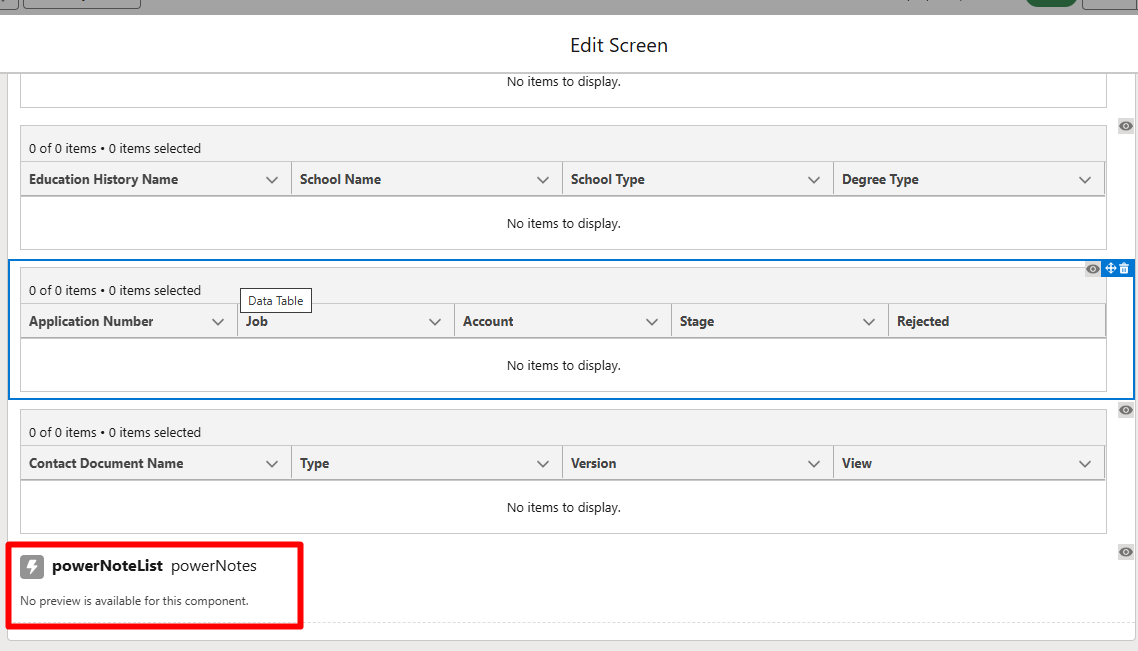
-
Specify values for the following:
-
Save changes, and activate the new version of flow.
-
Reload the page with flow added and ensure that Power Notes List Combined View is displayed according to settings.
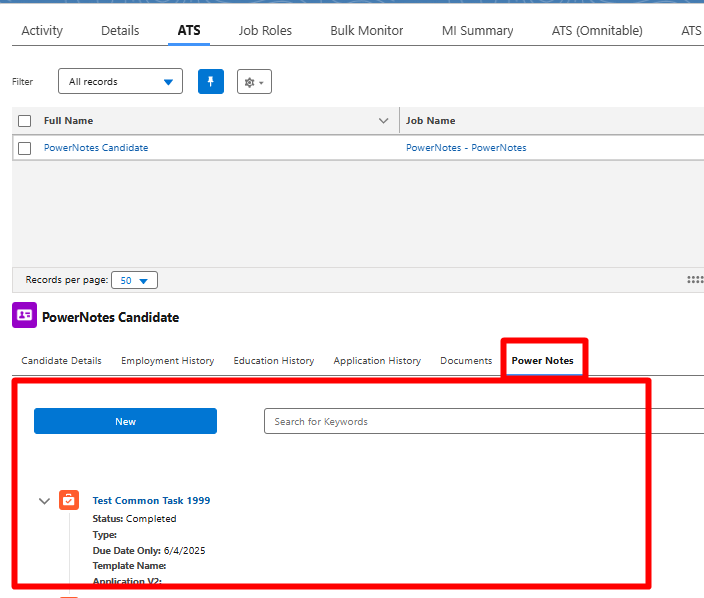
Contextual Data Viewer can also be configured with an omnitable to show activity per application selected.
Configure a Custom Date/Time Field Used to Sort Activities on the Combined View
By default, to sort Activities on the Power Note List Combined View, the Date_To_Sort_By__c formula field is used. To configure a different field to sort Activities, complete the following steps.
-
Optional Step: Create a new Date/Time field on the Activity object.
-
Specify the API name of the field in the following location: setting.
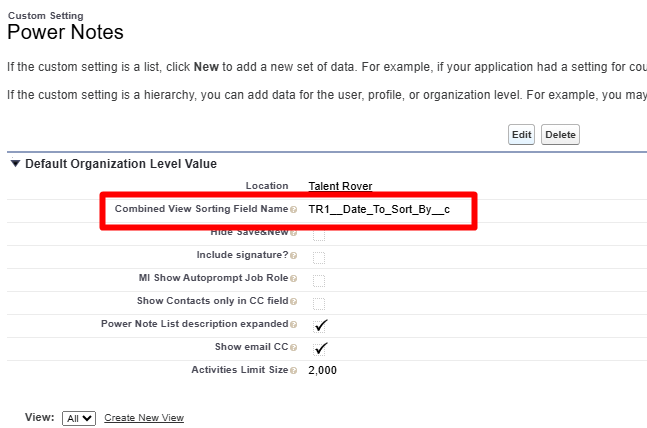
Configure Search by Keywords & Lookups for Power Note Supported Objects
The search functionality within the combined activity timeline has been enhanced to allow users to find activities and notes more quickly by searching on keywords and lookups. This update expands the search beyond just the subject and description fields to include all text fields on an activity, as well as specific fields on related records.
It is possible to configure searchable parent fields via a field set only for notes supported objects that are related to Activity via custom fields, other than WhoId or WhatId (for those leave the Searchable Field Set value blank so search could work by WhoId, WhatId, What.Name, Who.Name, Who.Email fields by default).
To configure parent fields supported as per the Power Note List keyword search:
-
Create a field set for the Power Note Supported object (EX: for Job (TR1__Job__c)) to outline object fields to be searched by as part of a keyword search. The following field types are supported:
-
Address
-
Email
-
Picklist
-
Phone
-
Text
-
Url
-
Text Area
-
Id
-
Lookup
-
-
Update the respective Power Notes Supported Object record to populate the field set API name for the Searchable Field Set field value:
Users are able to search across all objects contained within the combined activity timeline. It’s important to note that the keyword being searched for does not have to be included in the displayed fields.
Example
Here we are searching for a candidate by the name (lookup field) of "Roland", but this keyword is not in the displayed fields.
On opening the task, you will see the candidate's name is displayed.
It is possible to configure searchable parent fields via a field set only for notes supported objects that are related to Activity via custom fields, other than WhoId or WhatId (for those leave the Searchable Field Set value blank so search could work by WhoId, WhatId, What.Name, Who.Name, Who.Email fields by default).
Technical Details
From a technical perspective, the keyword search is enhanced to use SOQL + SOSL combination:
-
The SOQL query is used to find the search term in the by the parent fields (WhatId, What.Name, TR1__Job__r.TR1__Job_Title__c, etc.)
-
The SOSL query is used to find the search term in any Activity (Task/Event) text fields, not only Subject and Description.
Using the Combined Activity Timeline
The core functionality of the Combined Activity Timeline should provide a familiar user experience with the ability to search and filter activities to find key items quickly, and easily create Power Notes and Shares.
Enabling & Configuring Combined Activity Timeline Actions
Administrators can configure quick actions for the Combined Activity Timeline Actions, in order for recruiters to run tasks and actions from directly within the timeline, without having to navigate away.
To effectively use the Combined Activity Timeline component, you must create custom metadata records for Combined Activity Timeline Actions. These records require the following fields:
-
Label (Name): Used solely for setup.
-
Combined Activity Timeline Action
 When used in ATS or Search and Match UI, one of multiple actions available after user has selected a sub-set of Candidates Name (DeveloperName): This value is used in the component's setup.
When used in ATS or Search and Match UI, one of multiple actions available after user has selected a sub-set of Candidates Name (DeveloperName): This value is used in the component's setup. -
Flow Name: The API name of a Screen Flow to be executed by this action. The Flow must accept `recordId` as a parameter. This field should be empty if a Global Action is used instead.
-
Action Label: The action label displayed on the UI. This can be plain text or a custom label.
-
Action Component: The Developer Name of a Global action that can be executed. This field should be empty if a Flow is used instead.
-
Icon Name: The SLDS icon name to be displayed on the UI (e.g., “standard:event”).
Additionally, enable the User![]() In Salesforce terminology, this is anybody that has login access to an instance. In Bullhorn Recruitment Cloud instances, usually the staff of recruiting companies Configured Actions checkbox on the PowerNotesList component within the Page/Flow builder. Then, populate the Custom Actions List with a semicolon-separated list of DeveloperName values from the Combined Activity Timeline Action custom metadata type records (EX: New_Event; Log_a_Call; New_Task_Person).
In Salesforce terminology, this is anybody that has login access to an instance. In Bullhorn Recruitment Cloud instances, usually the staff of recruiting companies Configured Actions checkbox on the PowerNotesList component within the Page/Flow builder. Then, populate the Custom Actions List with a semicolon-separated list of DeveloperName values from the Combined Activity Timeline Action custom metadata type records (EX: New_Event; Log_a_Call; New_Task_Person).
- The order of actions in the Custom Actions List will be reflected on the UI.
- If there are more than five actions, the excess actions will appear in a drop-down list.
The New (Power Note) and New Share actions can also be enabled for User Configured Actions using existing configurations, and they will always appear first on the UI.
Precreated Actions
Three out-of-the-box actions are ready for use:
- Log a Call (Log_a_Call)
- New Event (New_Event)
- New Task - Person (New_Task_Person)
These actions execute related global actions and can be used to populate the Custom Actions List attribute of the Activity Timeline component.
Creating Custom Actions
Supported types of custom actions include:
-
Global actions
-
Flows
Any other action type must be presented as one of these two types. If a Flow is used, it must accept recordId as a parameter, even if the parameter is not utilized within the action logic. The recordId refers to the Record Id of the page from which the Activity Timeline is being viewed.
Custom Labels
- Power_Notes_Activity_Types_Value_Error: Error shown when the Activity Types value is not set for Power Note List component when the 'Use Combined
- Power_Notes_Combined_View_Sorting_Field_Error: Error shown when the Combined View Sorting Field Name is incorrect.
- Power_Notes_Combined_View_Subject_Filter: Power Notes Subject filter label for Combined View
- Power_Notes_Keyword_Search_Field_Error: Error thrown when Power Notes object field is not supported for keyword search
- Power_Notes_Search_Input_Value_Too_Short: Warning shown when Power Notes keyword search input value is too short
Limitations, Assumptions & Known Behaviour
- Subject filter is supported only for Power Notes / Shares.
- Table View is not supported.
- When specifying several Combined Activity Timeline Configuration records with the same Object and Record Type Name, ensure that the Subtype value is also set. Otherwise, the results of getting notes and their filtering will be incorrect.
- Event object has the ActivityDateTime (Date/Time) field by default, but the Task - only ActivityDate (Date) field, so when the default Combined View sorting is applied (using the Date_To_Sort_By__c field) for Tasks, the Date_To_Sort_By__c field value represents the ActivityDate field value cast to the Date/Time format. e.g. 2025-06-30T00:00:00.000+0000.
- This effectively means that a Task for the same day as an Event will come after the event.
- Emails will only appear in the Combined Timeline when they have been configured
- For standard Activity Types (other than Power Notes / Shares), the search works only by WhoId, WhatId, What.Name, Who.Name, Who.Email fields.
- For Power Notes objects related to Activity via the WhoId or WhatId field, when the field set name is not specified in the Searchable Field Set field, the search works by WhoId, WhatId, What.Name, Who.Name, Who.Email.
- The search is going to support all Activity (Task/Event) text fields, not only Subject and Description.
- The user must enter at least 2 characters for the search to work.
- The keyword search is case-insensitive.
- ‘-’ character is not supported and causes an error
Data Model
Combined Activity Timeline Configuration (Combined_Activity_Timeline_Configuration__mdt) Custom Metadata Type
Defines the configuration for Task/Event Record Types, displayed fields, and activity types on the Combined Activity Timeline.